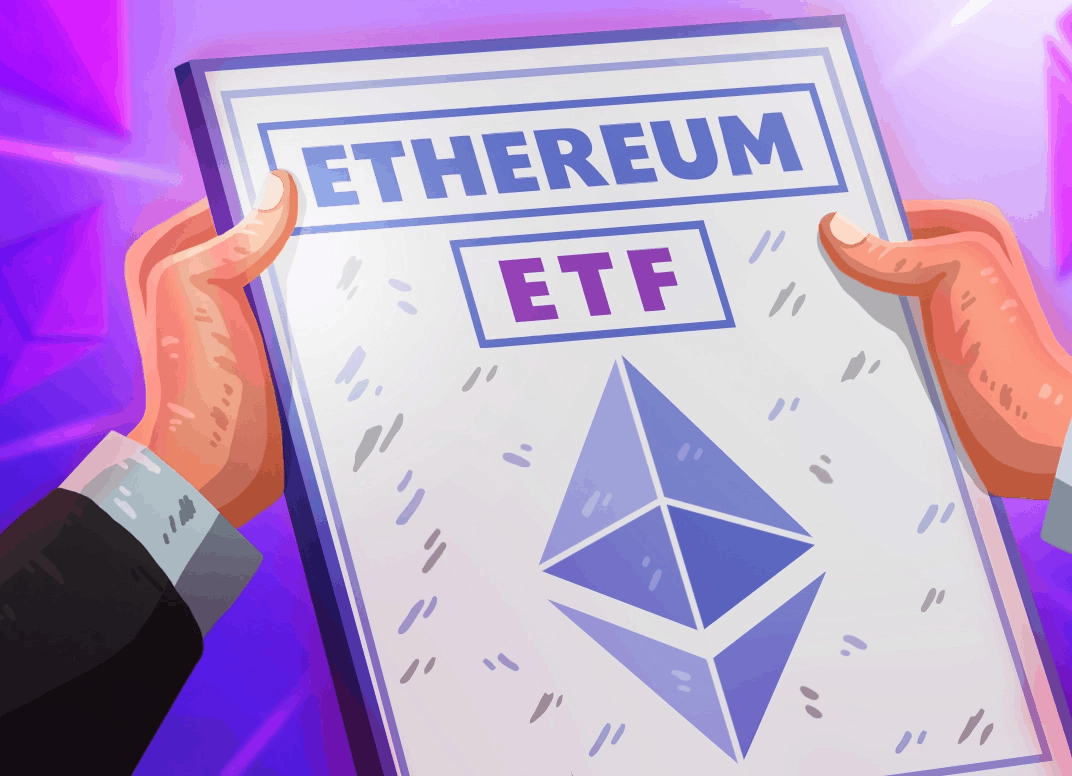What is Ethereum ETF? Ethereum ETF is a type of fund traded on the stock exchange, simulating or following the price index of Ethereum. ETFs are a way that investors can access and invest in Ethereum without directly buying and holding these cryptocurrencies. Instead, they buy ETF shares, which allow them to share in the growth potential and risk of Ethereum but still trade on a traditional stock exchange.
To better understand Ethereum ETF, people can refer to some of the articles below:
- What is Ethereum? All About Ethereum
- What is a Bitcoin ETF? Bitcoin ETF Spot, Bitcoin ETF Future & Exploding Dynamics of the Crypto Market
- What is SEC? All About the Securities Exchange Commission
Ethereum ETF Overview
Overview of ETFs
ETF is the abbreviation for Exchange-Traded Fund, which means Fund traded on the exchange. This is a type of investment fund that pools the money of many investors to buy diverse assets, such as stocks, bonds, commodities or cryptocurrencies. ETFs are traded on stock exchanges and their value generally reflects the value of the assets in the fund. Investors can buy and sell ETF shares like buying and selling regular stocks on the market. ETFs offer benefits such as high liquidity, risk diversification and cost savings compared to directly purchasing individual assets.
Advantages of ETFs include:
- High liquidity: ETFs are traded on the stock exchange, so investors can buy and sell ETF shares easily and quickly during trading hours.
- Diversify risks: ETFs allow investors to access and invest in many different industries, countries or assets through a single fund. This helps reduce individual risk and increase portfolio diversification.
- Cost savings: Compared to purchasing individual assets, investing in ETFs saves on transaction and management costs, as the transactions involved in buying, selling and managing the portfolio are performed on a common fund structure.
- Clarity: ETF, by publishing information about its portfolio of assets on a daily basis, helps investors get an accurate view of their investment portfolio and manage risks.
What is Ethereum ETF?

Ethereum ETF (Exchange-Traded Fund) is a type of stock exchange-traded fund designed to track and invest in the Ethereum cryptocurrency. This is one way investors can gain exposure to Ethereum without directly purchasing and storing the cryptocurrency.
An Ethereum ETF allows investors to purchase shares of the fund with the goal of capturing the value of Ethereum or tracking the Ethereum market index. This provides convenience and savings along with the large number of different features offered by ETFs, such as high liquidity and the ability to diversify portfolios.
Benefits of Ethereum ETF
Ethereum Exchange-Traded Funds (ETFs) offer several benefits to investors. Here are some key benefits of the Ethereum ETF:
- Diversification: Ethereum ETF allows investors to access the Ethereum market without directly owning and managing the code through traditional exchanges. This helps diversify your portfolio and reduce the risk of betting on just one asset.
- Easy access: ETFs are typically available on public exchanges, allowing investors to easily buy and sell stocks during the regular course of trading. This helps increase liquidity and flexibility in buying and selling Ethereum.
- Professional management: When investing in Ethereum ETF, investors do not need to worry about the management and security of their digital assets. This ensures that the experts managing the ETF will oversee and manage Ethereum for the benefit of shareholders.
- Avoid risks associated with hosted wallets: Storing and securing Ethereum can be complex and requires knowledge of cybersecurity. When investing through an Ethereum ETF, investors do not need to worry about keeping their code and private keys secure.
Risks of Ethereum ETF
Some disadvantages of the Ethereum ETF (Exchange-Traded Fund) may include:
- Risks related to the cryptocurrency market: Ethereum ETFs depend on the success and volatility of the cryptocurrency market. If the value of Ethereum plummets, the ETF could also be negatively affected and cause a loss of value for investors.
- Management discipline: The performance and success of the Ethereum ETF depends on the discipline and management ability of the fund managers. If the fund is not managed well, makes the right decisions and follows the rules, the ETF may not attract investor interest.
- Systemic risk: A risk that cannot be ignored is the ETF’s operating system. If the system experiences problems, such as technical issues, cyber attacks or management errors, investors may have difficulty buying, selling or tracking ETFs.
- Related costs: Similar to other exchange-traded funds, Ethereum ETFs also have associated costs, including management fees, buying and selling fees, and other fees. These costs can affect investor profits.
- Regulations and related legal issues: ETFs must comply with the regulations and rules set forth by the asset management organization and the financial regulatory commission. The development and approval of an Ethereum ETF may be affected by other legal and regulatory requirements for the cryptocurrency technology industry.
These disadvantages should be carefully evaluated before deciding to invest in an Ethereum ETF, and should be considered to ensure that they are appropriate for each investor’s personal investment goals and circumstances.
Difference between Ethereum ETF Spot and Ethereum Future

ETF Spot and ETF Future are two different types of investment products in the field of ETF (Exchange-Traded Fund).
- ETF Spot (also known as a standard ETF) is a fund that trades on an open exchange and is indexed to reflect the performance of a specific index, asset group or industry. Spot ETFs buy and sell on public exchanges at the closest market price.
- ETF Future (ETF futures contract) is a financial contract in which parties commit to buy or sell a spot ETF at a fixed price at a certain future time. This is a range of futures investments and is often traded on derivatives exchanges.
The main difference between ETF Spot and ETF Future lies in how they are traded and regulated. ETF Spot is traded on an open exchange at current market prices, while ETF Future is a futures contract with a fixed future price.
Although they have some similarities such as providing diversification and easy exposure to asset classes, the trading style and nature of these types of ETFs have important differences.
Current Situation of Ethereum ETF
Currently, the Ethereum ETF is available and not yet available in some countries such as:
- Canada: There are several Ethereum ETFs traded on Canadian stock exchanges, including CI Galaxy Ethereum ETF (ETHX), Purpose Ether ETF (ETHH), and Evolve Ether ETF (ETHR). These funds track the real value of Ethereum.
- USA: Currently, there is no Ethereum ETF approved and traded in the United States. The U.S. Securities and Exchange Commission (SEC) has not yet approved any cryptocurrency ETFs due to concerns about volatility, liquidity, and digital asset management. Some Ethereum ETF proposals, such as the VanEck Ethereum Trust ETF, are still awaiting approval.
- Europe: ETFs tracking Ethereum are also not yet available on European exchanges. Regulators like ESMA have also expressed concerns about crypto ETFs.
- Asia: Some Asia-Pacific exchanges such as ASX in Australia have an Ethereum ETF portfolio. Examples include the ETFS Ethereum ETF (EETH). However, Asia is behind North America in crypto ETF development.
Canada currently has the most developed Ethereum ETF market, while the United States and Europe still do not have an Ethereum ETF. However, the situation is quickly changing and there are new applications happening globally to launch Ethereum-based ETF products.
Most recently, in the US, the SEC officially approved an Ethereum ETF Future. With this statement, it is highly likely that the SEC does not consider Ethereum to be a security.
The Impact of Ethereum ETF
The Ethereum ETF could have some influence on the world of cryptocurrency and related sectors, including:
- Expanding access to cryptocurrencies: Ethereum ETF can help expand access and participation in the cryptocurrency market for traditional investors. As ETFs provide an easy way to invest in Ethereum, investors do not need to directly purchase Ethereum, which can increase the appeal of the cryptocurrency and attract new capital.
- Increase liquidity: Ethereum ETF could provide greater liquidity to Ethereum and the cryptocurrency market in general. Listing an ETF on a traditional exchange creates a seamless and convenient circulation for investors wanting to buy and sell Ethereum, increasing the flexibility and reliability of this market.
- Increase adoption of cryptocurrencies: Ethereum ETF could help cryptocurrencies and blockchain technology become more famous and widely accepted. When traditional ETFs get involved in investing in Ethereum, it can create trust and confidence in the cryptocurrency, promoting adoption and positive awareness of the technology.
- Create momentum for further development: The launch of the Ethereum ETF could provide momentum for the further development of the cryptocurrency market. When traditional ETFs step in, it could mark an important step forward in recognition and support for cryptocurrencies, encouraging investment and growth of Ethereum-based projects.
However, the influence of the Ethereum ETF still depends on various factors, including approval and regulation by financial regulators, the state of the cryptocurrency market, and interactions with other factors. global economic factors.
Summary
The Ethereum ETF carries with it a series of potential benefits for the cryptocurrency market. The emergence of a traditional ETF for Ethereum could expand cryptocurrency exposure to traditional investors, increasing liquidity and democratizing cryptocurrencies. It could create an increase in acceptance and trust in blockchain technology and Ethereum, along with fueling the further growth of the cryptocurrency market.
However, the influence of the Ethereum ETF depends on many factors, including approval from financial regulators, the cryptocurrency market situation and interaction with global economic factors. At the same time, it should be noted that the launch of an ETF does not guarantee the growth or stability of Ethereum or the cryptocurrency market in general.
Regardless, the Ethereum ETF still gains great interest from the cryptocurrency community and investors. The growth and potential of the Ethereum ETF is an indicator of the advancement and growing usage of Ethereum and Blockchain technology. Hopefully through this article, people can learn more about what Ethereum ETF is?


